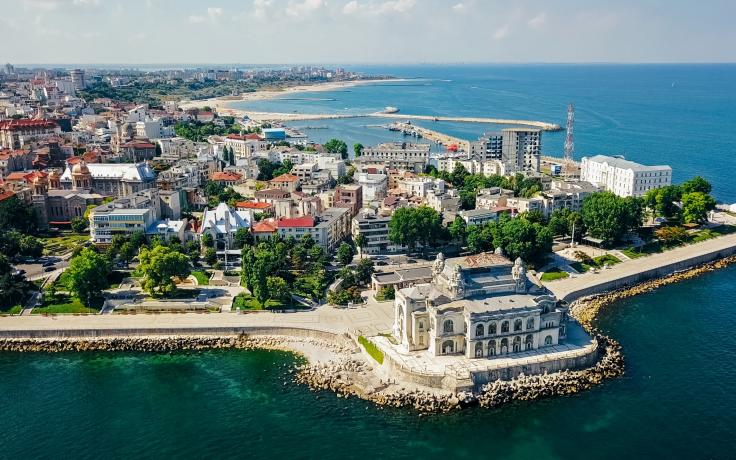Domestic and Sexual Violence Sentences ‘Often Lenient’ in South-East Europe
Romanian women at a protest entitled ‘Misogyny – the other pandemic!’ in front of the government headquarters in Bucharest, March 2021. Photo: EPA-EFE/ROBERT GHEMENT
The US State Department’s global human rights report for 2022, published on Monday, said that in the majority of south-east European countries, perpetrators of domestic violence and rape often receive lenient sentences.
In some countries, the authorities also fail to properly investigate spousal rape cases, according to the State Department report.
Bulgaria is one of the countries where spousal rape is not a crime, although “authorities could prosecute spousal rape under the general rape statute, but rarely did so”, the report said.
Bulgaria’s law on gender-based violence was enforced effectively, but according to NGOs the law does not provide sufficient protection for the victims.
“The law restricts the persons who can report domestic violence to the survivor or the survivor’s direct relatives and excludes friends and other unrelated persons,” the report said.
“According to NGOs and the ombudsman, the law does not provide sufficient protection to survivors of domestic violence as it does not provide for prosecution of offenders for inflicting a medium injury (eg. a broken tooth) or a more serious injury, such as deliberately infecting a person with a sexually transmitted disease,” it added.
Albania also had issued with prosecutions for spousal rape, the report said: “The concept of spousal rape was not well understood, and authorities often did not consider it a crime” despite it being illegal.
Gender-based violence was reportedly a serious problem in Albania. “As of September, police reported 4,136 cases of alleged gender-based violence, including other domestic crimes,” the report said.
“NGOs reported high levels of gender-based violence, including domestic violence. As of September, seven women had been killed by their partners or family members,” it added.
Police in Bosnia and Herzegovina failed to treat spousal rape as a serious offence, which “inhibited the effective enforcement of the law”, according to the report.
“Women survivors of rape did not have regular access to free social support or assistance as mandated by the law and continued to confront prejudice, stigma, and discrimination in their communities and from representatives of public institutions,” it noted.
On top of this, the authorities rarely removed domestic abusers from households despite laws enabling this in both the country’s entities.
Domestic violence was widespread in the country, however, according to the report: “The Gender Equality Agency reported that one of every two girls and women over age 15 experienced some type of domestic violence,” it said.
In Greece, the report said that the authorities “generally enforced the law effectively when the crimes were reported”, but some NGOs said that “law enforcement authorities did not respond appropriately to survivors reporting domestic violence”.
In Hungary meanwhile, women’s rights groups alleged that “prevention, survivor protection, and prosecution efforts by the state in domestic violence cases were not sufficient”, the report said.
Police attempt victim-perpetrator ‘reconciliation’
A protester stands before Turkish riot police during a rally marking International Women’s Day in Istanbul, March 8, 2023. Photo: EPA-EFE/SEDAT SUNA.
In Kosovo, rape is punishable by two to 15 years in prison, but the sentences are not being enforced effectively, according to the report.
The EU rule-of-law mission in Kosovo, EULEX told the State Department that “courts often applied penalties lighter than the legal minimum in rape cases and that law enforcement bodies rarely took steps to protect survivors and witnesses”.
“In addition, sentences were often further decreased by the appellate court. Instances of gender-based violence, including sexual violence and rape, were rarely reported by survivors, frequently due to social stigma or lack of trust in authorities,” the report added.
In Romania, the law envisages five to 10 years’ imprisonment for rape and two to seven years’ imprisonment for sexual assault. “If there are no aggravating circumstances and the attack did not lead to death, police and prosecutors may not pursue a case on their own, but they require a survivor’s complaint, even if there is independent physical evidence,” the report said.
It added that that human rights activists reported that “some police officers tried to dissuade survivors of rape or domestic violence from pressing charges against their aggressors and, in some cases, refused to register criminal complaints submitted by victims”.
Romanian police have occasionally delayed taking action against sexual abusers or even tried to reconcile the victim with the aggressor, according to the report.
An electronic monitoring system for restraining orders was established by a law that was enforced in 2021, but the government postponed the implementation of the system until October 2022, and it will take until 2025 for it to fully be implemented throughout Romania.
“According to an investigation by independent investigative journalist website Dela0.ro, of the 26,500 restraining orders issued between 2019 and 2021, 7,200 were violated, while only 500 such cases were sent to court,” the report said.
In Moldova, the report said that rape, including spousal rape, can be published with sentences ranging from three years to life in prison, although the victims must “prove they were subjected to violence”.
However, the report added that “domestic violence resulting in ‘nonsignificant bodily harm’ falls under the contraventions code, rather than the criminal code, and may be punished by a fine or community service”.
The report also said that in Moldova, “marital rape was rarely reported, as 50 per cent of women considered that sexual intercourse during marriage was a marital obligation”.
Meanwhile, “survivors of violence were often re-traumatised by the system and subjected to social stigmas”, it added.
In Montenegro, the report said that sentences were generally lenient, three years on average.
“Judges often used questionable methods, including forcing confrontations between survivors and alleged perpetrators, to assess the credibility of survivors,” the report said.
It added that “domestic violence is generally punishable by a fine or a one-year prison sentence”.
Montenegrin police also try to reconcile victims, mainly women, with their attackers, “counselling women to ‘forgive’ their attackers or to ‘not harm their (the attackers’) job prospects’”.
Women of Roma or Egyptian ethnic backgrounds “often faced increased barriers to escaping domestic violence, including potential condemnation and abandonment by their broader family and loss of access to their children”, the report noted.
The report said that in North Macedonia, the ombudsperson concluded that sentences were “overly lenient” and “did not contribute to a reduction and elimination of severe forms of domestic violence nor provide sufficient protection to survivors”.
“From January to June, the Ministry of Labour registered 662 survivors of domestic violence, of which 463 were women, and 83 children. In June the ministry launched an awareness campaign on gender-based violence,” the report noted.
In Serbia, victims of domestic and sexual abuse often do not trust the authorities enough to report the crimes, according to the report.
“While the law provides women the right to obtain a restraining order against abusers, the government did not enforce the law effectively. The head of the Coordination Body for Gender Equality announced that through mid-December, 26 women had been killed in family/partnership violence,” it said.
“As of September there were 238,174 reported instances of domestic violence since the law was introduced in 2017. According to the National Statistical Bureau’s research on gender-based violence, one in five women suffered psychological abuse from a partner, one in ten suffered physical or sexual violence, and one in five was sexually harassed in their workplace,” the report added.
In Turkey, women’s rights groups reported that survivors of domestic and sexual abuse were not being protected, as “gender-based violence, including domestic and intimate partner violence, remained a serious and widespread problem both in rural and urban areas”, the report said.
It noted that in 2021, President Recep Tayyip Erdogan withdrew the country from the Council of Europe Convention on Preventing and Combating Violence against Women and Domestic Violence, also known as the Istanbul Convention, claiming that it normalises homosexuality.
The report said that sometimes government-employed counsellors and police officers “encouraged women to remain in abusive marriages at their own personal risk rather than break up families”, and that police do not implement court restraining orders effectively.


 Airbus A321neo LR long-haul Middle East Europe
Airbus A321neo LR long-haul Middle East Europe  ALPLA expands in South-East Europe
ALPLA expands in South-East Europe  Amil Družić: Preventing HPV-Related Cancers in South-East Europe
Amil Družić: Preventing HPV-Related Cancers in South-East Europe  NATO countries pledge more aid to east Europe
NATO countries pledge more aid to east Europe  South East Europe Green EPC & Infrastructure | IRU
South East Europe Green EPC & Infrastructure | IRU  Baker Tilly South-East Europe becomes part of MHA
Baker Tilly South-East Europe becomes part of MHA